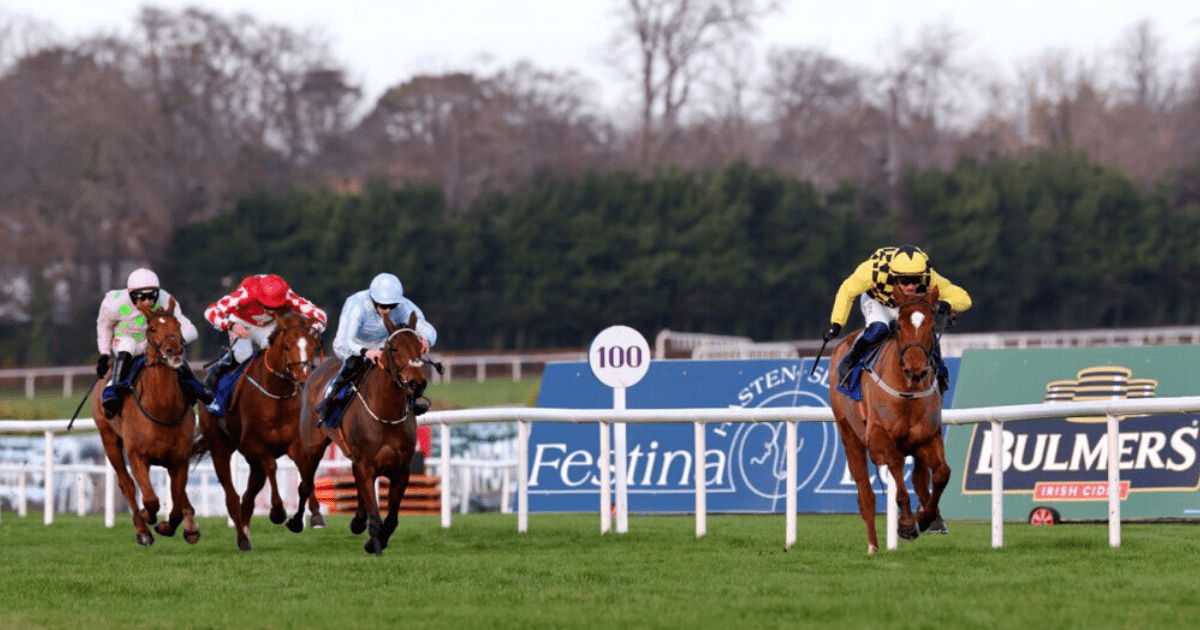State Man Eyes Back-to-Back Victory in Prestigious Race
The Irish Champion Hurdle took place today, and all eyes were on State Man as he aimed for a second consecutive win in this prestigious race. Sun Racing has all the details on the full results and how each horse fared in this year's thrilling showdown at Leopardstown.
Full Result: Irish Champion Hurdle 2024
The complete result and horse placings will be provided shortly. Stay tuned for the exciting finish!
Dublin Racing Festival Schedule
If you're a horse racing enthusiast, you won't want to miss the thrilling action at the Dublin Racing Festival. Here's the schedule for Sunday, February 4th:
- 12:40: Irish Stallion Farms EBF Paddy Mullins Mares Handicap Hurdle
- 13:10: Ladbrokes Novice Chase
- 13:40: Tattersalls Ireland 50th Derby Sale Novice Hurdle (Grade 1)
- 14:10: Ladbrokes Dublin Chase
- 14:45: Chanelle Pharma Irish Champion Hurdle
- 15:20: O'Driscolls Irish Whiskey Leopardstown Handicap Chase
- 15:50: Liffey Handicap Hurdle
- 16:25: Coolmore N.H. Sires Hurricane Lane Irish EBF Mares I.N.H. Flat Race
Gamble Responsibly
Before engaging in any form of gambling, it is essential to follow responsible gambling practices. Here are some key tips:
- Establish time and monetary limits before playing
- Only gamble with money you can afford to lose
- Never chase your losses
- Avoid gambling if you're upset, angry, or depressed
If you or someone you know is struggling with a gambling problem, help is available. Contact the GambleAlert Helpline at +234 9162957989. For more information and resources, visit Gamble Alert at gamblealert.org or Gamble Aware at www.begambleaware.org.
Remember to enjoy the excitement of horse racing responsibly!
Frequently Asked Questions
How often must racehorses receive training?
Training frequency for racehorses is usually tailored to the individual horse’s needs, level of fitness, and racing schedule. In general, racehorses will have a daily exercise routine that includes walking, trotting, or cantering. This is followed by more demanding work, like galloping or breezing at least three times a weekly, to improve stamina. Rest days will allow your horse to recover, and help prevent overtraining.
What is the age at which a horse should begin racing training?
Horses can start their basic training as yearlings, but most begin their more rigorous race training and conditioning when they are around two years old. It is at this age that their bodies are ready to take on the demands of the racetrack, yet still young and flexible enough to adapt. However, the exact timing may vary depending on the individual horse’s development and temperament.
What’s the role of a jockey in training a racehorse?
Jockeys have a crucial role to play in the training of racehorses. The jockeys ride the horses, giving feedback on their performance. They also help to educate the horse in racing tactics, like pacing the horse, positioning it, and responding when given commands. The jockey’s ability to understand the horse and its strengths and weakness is crucial for preparation.
How can you ensure the mental wellbeing of your racehorse?
The mental health of a racing horse is just as important as its physical condition. Mental stimulation, gentle handling, and regular pasture turnout all contribute to the psychological well-being of a racehorse. By ensuring the horse is socialized with other horses in a stable, calm environment, you can prevent stress and behavioral problems.
How do I condition a horse for racing?
Racehorse conditioning is a gradual, multi-faceted process. It involves both longer, slower distance work, which builds stamina, as well shorter, quicker workouts, which develop speed. A carefully designed regimen of exercise must gradually strengthen the horse’s cardiovascular, muscular, and skeletal system. This is done to mimic the stress of racing, without injuring or overstressing it.
Do different breeds of horses require different training methods?
Different horse breeds have different characteristics, and the racing distances can also vary. Thoroughbreds which are associated with long distance flat racing undergo different training to Quarter Horses which specialize in sprinting over short distances. Each breed is unique and requires a different approach to match their physical characteristics and behaviors.
Statistics
- Research has found that a racehorse’s stride length can increase by up to 7% following specific strength and conditioning programs.
- Gastrointestinal issues affect up to 90% of racehorses during their training, emphasizing the need for careful dietary management.
- The average cost to train a thoroughbred racehorse for one year can exceed $50,000, accounting for expenses related to training, boarding, and veterinary care.
- Racehorse mortality rates during racing have been observed to be between 1.5 to 2 deaths per thousand starts, depending on the racing jurisdiction.
- An extensive survey indicated that over 90% of racehorse trainers utilize swimming as a low-impact exercise in their conditioning routines.
- The majority of racehorses in training are subject to an exercise regimen that includes being ridden six days a week.
External Links
britishhorseracing.com
racingpost.com
jockeyclub.com
grayson-jockeyclub.org
equibase.com
keeneland.com
How To
How To Educate A Racehorse On Racing Strategies
A combination of trackwork, guidance and an experienced jockey is required to educate a horse on racing strategy. Practice gate starts, pacing, positioning, and response to varying tempos within a race. Play different race scenarios in order to develop adaptability, and to expose the horse to competitive dynamics. A well-trained horse can perform strategic moves and pace changes according to their rider’s instructions, which will have a significant impact on the outcome.

